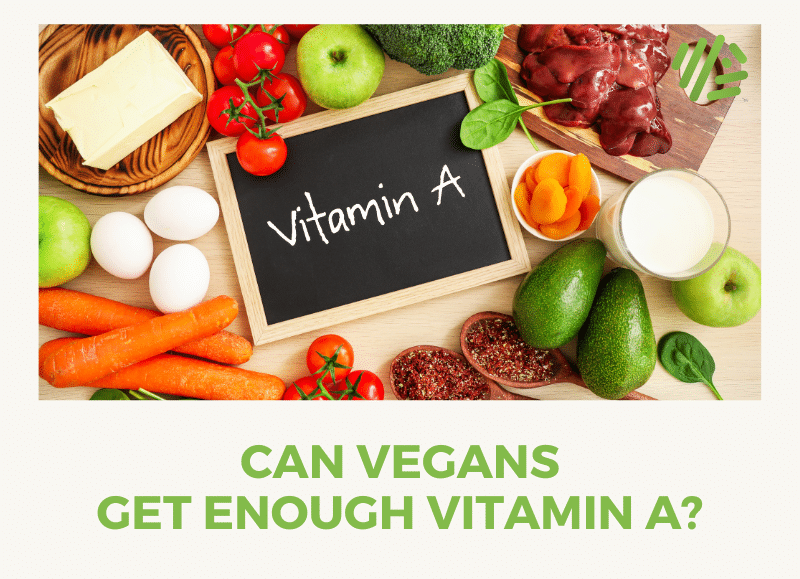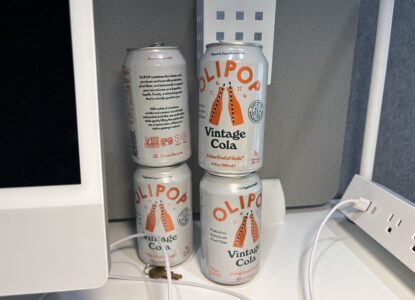Why Vitamin A Deficiency is a Concern for Vegans
Article at a Glance
- Some Vegans are at risk for Vitamin A deficiency because they lack the enzymes necessary to convert beta-carotene into retinol, the bioactive form of Vitamin A.
- This reduced enzyme activity is genetic.
Genes Mentioned

Contents
Whether your concern is health, climate change, animal rights, or all of the above, Vegan and plant based diets are increasing in popularity. And while getting more plants in your diet is almost always a healthy choice, strict Vegans should be vigilant about getting adequate micronutrients, like the B vitamins and adequate omega 3 fats.
However, a lesser known potential deficiency for Vegans is Vitamin A. In today’s post, I will discuss the genetic variants that can predispose some Vegans to a greater risk of Vitamin A deficiency. This article discusses our BCO1 genes, and how they influence the body’s ability to convert beta-carotene into an active form of Vitamin A, called retinol.
Vitamin metabolism is complex
One of the fascinating things about nutrigenomic research is the opportunity it affords to study the metabolic efficiencies of the human body. Many of our “nutritional inputs” have to change form before they’re useful as fuel for our cells, and our genes play an important role in helping to produce the enzymes that break down nutrients into a form the body can use. For example, it’s the VDR genes that help us make the active form of vitamin D, called calcitrol, so it can be used to absorb calcium from the gut.
Similarly, our MTHFR genes help us break down folate into 5-MTHF (methylfolate). The short chain omega-3 fats, like alpha linoleic acid, must be converted to the long chain EPA and DHA, and some of us with certain FADS1 variants, don’t convert any ALA into DHA.1
Vitamin A: plant and animal sources
Vitamin A is a powerful antioxidant responsible for supporting healthy skin, vision, bone growth, and immune function, among other things. We can get Vitamin A from both plant and animal sources. 2
Retinol
Eggs, for example, are rich in a form of Vitamin A called retinol. Retinol, famous in many circles as the main ingredient in anti-aging skin treatments, is readily bioavailable, meaning it is consumed in a form the body can make use of right away.
Carotenoids
The other source of Vitamin A comes from fat soluble antioxidants known as carotenoids, which are plant based. Beta carotene, found in foods like carrots and yams, is a type of carotenoid that our bodies convert to Vitamin A (retinol). 3
We are easily able to absorb retinol derived from animal products, however, the bioavailability of plant based sources is more limited, meaning we lose Vitamin A in the process of converting beta-carotene to retinol. 4
Vitamin A deficiency in Vegans
- This is where the possibility for a vitamin A deficiency comes into play, especially for vegans.
- Since our bodies aren’t as effective at breaking down plants into vitamin A, a diet that excludes all animal-based products could set the table for a Vitamin A deficiency. This possibility increases when specific variants or “mutations” in our BCO1 genes are present.
- There is genetic variability in B-carotene metabolism. 5
- The protein encoded by the BCO1 gene, called beta-carotene 15,15′-monoxygenase (BCMO1), is a key enzyme in beta-carotene metabolism to vitamin A. 6
- Two common SNPs of the BCO1 gene, (R267S and A379V) have shown a decreased ability to metabolize beta carotene into retinol. 7 This means reduced amounts of bioavailable Vitamin A for carriers.
- Note: to date, the studies showing a decreased ability to convert beta-carotene to Vitamin A for these SNPs have only been performed in women, the evidence is inconclusive as to men. 7
- Perhaps this is why some Vegans turn orange on a high beta-carotene diet? They’re simply not converting beta-carotene to retinol effectively.
- For those with genotypes associated with a reduced ability to gain vitamin A from plant sources, a vegan diet could present some nutritional challenges because some studies show that vitamin A supplementation isn’t a great solution either.
Vitamin A and retinol supplements warning
There is evidence to suggest that food should be the preferred delivery mechanism for Vitamin A, as the same benefits are not conferred from supplements alone. 8 9
This study saw an increased risk for lung cancer and heart disease of 20% when beta carotene consumption exceeded the recommended dosage.
This study found a significant increase in hip fracture risk in postmenopausal women taking Vitamin A supplements and retinol in fortified food. To quote the study:
Long-term intake of a diet high in retinol may promote the development of osteoporotic hip fractures in women. The amounts of retinol in fortified foods and vitamin supplements may need to be reassessed.
It’s also important to note that dietary beta-carotene, as opposed to Vitamin A supplements, did not increase the risk for fracture.
Beta-carotene in food is healthy
For starters, studies show diets (we’re talking food here) high in carotenoids are healthy, and may reduce the risk of certain diseases. This study discusses the protective effect dietary beta-carotene can have on developing many types of cancers.
This study analyzed dietary beta-carotene’s protective impact on heart disease. This study discusses how dietary Vitamin A can protect against macular degeneration.
Modifications to a vegan diet to get Vitamin A
Changing nothing else and just supplementing with a daily spoonful of cod liver oil would get most Vegans the Vitamin A they need, that is assuming they carry a BCO1 SNP that prevents conversion from carrots and yams.
One serving of cod liver oil would provide 150% of the daily Vitamin A requirement.
Consider combining dietary beta-carotene with healthy fats
As we outline above, it’s perfectly reasonable if you prefer avoiding Vitamin A supplements. Short of eating an egg, or occasional piece of fish, or chicken, dietary fat could to be the answer to increasing Vitamin A levels for Vegans.
Beta-carotene is a carotenoid, which is a fat soluble nutrient. Studies have shown large increases in bioavailability of beta-carotene when it’s taken with fat. Foods like avocado, or olive oil, can be an excellent companion to high beta carotene foods like yam and carrots. Now, I know what you’re saying: if I have a BCO1 SNP, aren’t I unable to convert beta carotene to Vitamin A?
If so, what good does more beta carotene do? Yes, some BCO1 SNPs at a disadvantage in actually metabolizing beta-carotene, and it’s not clear if more bioavailable beta-carotene is the answer, it’s my theory, however, as with any nutrigenomic “mutation,” BCO1 is associated with reduced function, not zero function, you’ll still be converting some of the beta carotene to the Vitamin A your body can use.
Key Takeaways
As we’ve discussed, our BCO1 genotype plays a role in how easy it is for our bodies to get Vitamin A from beta-carotene. Most of the science surrounding beta-carotene’s health benefits studied sources of beta-carotene derived from food, as opposed to supplements. Vitamin A from animal sources, in the form of retinol, is readily absorbed by the body, but these sources are not available to Vegans. Vegans who don’t convert beta-carotene to Vitamin A well are faced with a choice between Vitamin A supplements, which have a shaky track record, and the occasional piece of cheese or spoonful of cod liver oil.




Thank you for this article, I am fully vegan and very much so appreciate your not biased views, keep up the good work!
I came across this article because I am vegan and just found out I am low in Vit A, according to a blood test. I was pretty surprised, since I eat a sweet potato or carrots every day and get the RDA of Vit A via these plant foods. Thank you for this info!
Thanks for the comment Amanda. Would be curious to know what your BCO1 status is. Have you had your genetics tested?
How do you find your BCO1 status when 23 and me does not report on this?
Heidi, the BCO1 genotype is included in the 23andme raw data, you need to extract it and take it to a provider like Gene Food that reads raw data to find your BCO1 status.